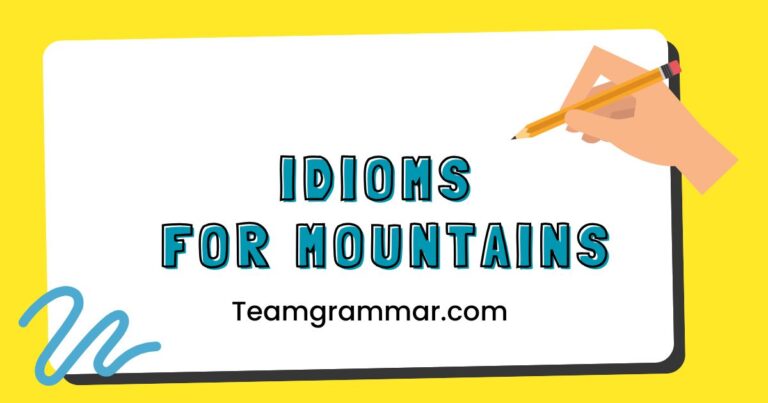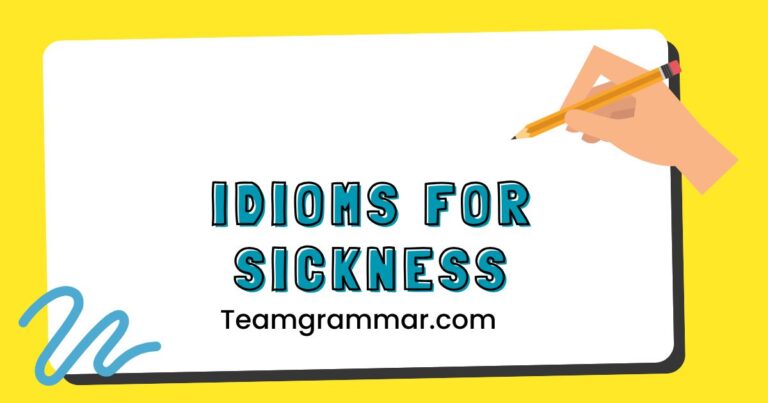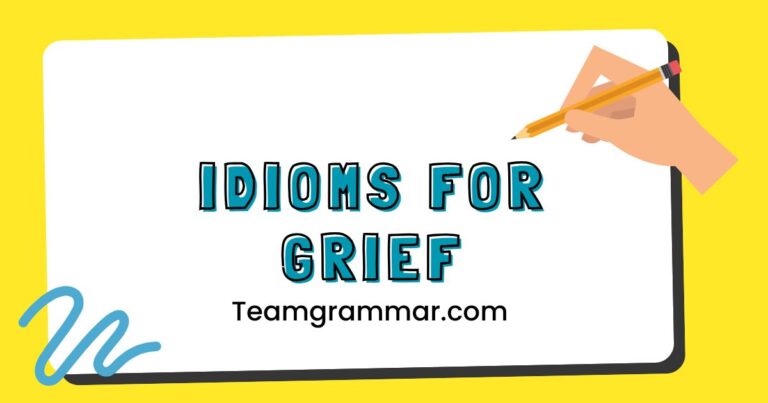42 Idioms for Ending: Mastering Closure in English
Idioms add color and depth to the English language, especially when describing the conclusion of events, relationships, or projects. Understanding idioms related to “ending” allows you to express nuanced meanings and connect with native speakers more effectively.
This article provides a comprehensive guide to idioms for ending, exploring their definitions, usage, and examples. Whether you’re an English language learner or a seasoned speaker, mastering these idioms will enhance your communication skills and provide you with a richer vocabulary to express closure.
This guide is designed for English language learners, writers, and anyone seeking to improve their understanding and use of English idioms. By understanding the nuances of these expressions, you can communicate more effectively and add depth to your conversations and writing.
Let’s dive into the world of idioms for ending!
Table of Contents
- Introduction
- Definition of Idioms for Ending
- Structural Breakdown
- Types and Categories of Idioms for Ending
- Examples of Idioms for Ending
- Usage Rules
- Common Mistakes
- Practice Exercises
- Advanced Topics
- FAQ
- Conclusion
Definition of Idioms for Ending
Idioms for ending are phrases or expressions whose meanings cannot be understood from the literal definitions of the individual words. Instead, they convey a figurative or symbolic meaning related to the conclusion, termination, or cessation of something.
These idioms are crucial for expressing complex ideas about endings in a concise and vivid manner. They often reflect cultural perspectives on closure, finality, and resolution.
These expressions can describe the end of a relationship, the completion of a project, the cessation of an activity, or even the end of life. Understanding their nuances is essential for effective communication in English.
The context in which an idiom is used often determines its specific meaning, emphasizing the importance of considering the situation and the speaker’s intent.
Classification
Idioms for ending can be classified based on the type of ending they describe. For example, some idioms relate to the end of relationships, while others pertain to the end of projects or activities.
Additionally, they can be categorized by their level of formality and the emotions they convey.
Function
The primary function of idioms for ending is to express closure or termination in a colorful and concise way. They add depth and nuance to communication, allowing speakers and writers to convey complex ideas and emotions more effectively.
These idioms can also be used to soften the impact of bad news or to add humor to a conversation.
Contexts
Idioms for ending are used in various contexts, including personal conversations, professional settings, and literary works. Their usage depends on the formality of the situation and the intended audience.
In formal settings, it’s essential to use idioms appropriately to avoid misunderstandings or appearing unprofessional. In informal settings, idioms can add color and personality to your speech.
Structural Breakdown
The structure of idioms for ending varies widely, as they can be phrases, clauses, or even single words used in a figurative sense. Understanding the structural elements of these idioms helps in deciphering their meaning and using them correctly.
Many idioms follow common grammatical patterns, such as verb phrases or prepositional phrases, but their meaning is not derived from the literal interpretation of these structures. Instead, the meaning is symbolic and culturally determined.
Verb Phrases
Many idioms for ending are verb phrases that include a verb and one or more other words, such as prepositions or adverbs. These phrases often describe the action of ending something.
For example, “call it quits” is a verb phrase that means to stop doing something.
Prepositional Phrases
Some idioms for ending are prepositional phrases that use a preposition to indicate the end of something. For example, “at the end of the road” is a prepositional phrase that means reaching the conclusion or limit of something.
Figurative Language
Idioms often use figurative language, such as metaphors and similes, to convey their meaning. Understanding the underlying figurative meaning is essential for interpreting and using idioms correctly.
For example, “pull the plug” is a metaphor that means to stop something, drawing on the image of disconnecting life support.
Types and Categories of Idioms for Ending
Idioms for ending can be categorized based on the specific type of ending they describe. This categorization helps in understanding the nuances of each idiom and using them appropriately in different contexts.
End of Relationships
These idioms describe the termination of personal or professional relationships. They often convey emotions such as sadness, relief, or anger.
Examples include “call it quits,” “break up,” and “go their separate ways.”
End of Projects
These idioms describe the completion or termination of projects, tasks, or endeavors. They often convey a sense of accomplishment or relief.
Examples include “wrap up,” “draw a line under something,” and “bring something to a close.”
End of Activities
These idioms describe the cessation of activities, habits, or behaviors. They often convey a sense of finality or resolution.
Examples include “put an end to,” “kick the habit,” and “call a halt to.”
End of Life
These idioms are used to euphemistically describe death or the end of someone’s life. They are often used to soften the impact of this sensitive topic.
Examples include “kick the bucket,” “pass away,” and “bite the dust.” While some are more serious, others can be considered humorous or even offensive depending on the context and audience.
Examples of Idioms for Ending
This section provides extensive examples of idioms for ending, organized by category. Each example includes a definition and usage in a sentence to illustrate its meaning.
Examples: End of Relationships
The following table provides examples of idioms related to the end of relationships. Each idiom is defined and illustrated with example sentences to clarify its meaning and usage.
| Idiom | Definition | Example Sentence |
|---|---|---|
| Call it quits | To stop doing something; to end a relationship or agreement. | After years of disagreements, they decided to call it quits and get a divorce. |
| Break up | To end a romantic relationship. | They decided to break up because they had different goals in life. |
| Go their separate ways | To end a relationship and live different lives. | Although they were once best friends, they eventually went their separate ways. |
| Part ways | To end a relationship or association. | After the project was completed, the team members parted ways. |
| Split up | To end a romantic relationship or partnership. | The band decided to split up due to creative differences. |
| Call off | To cancel or discontinue something. | They had to call off the wedding due to unforeseen circumstances. |
| Get a divorce | To legally end a marriage. | After many years of unhappiness, they decided to get a divorce. |
| Leave someone at the altar | To abandon someone at the wedding ceremony. | He left her at the altar, causing a huge scandal. |
| Wash your hands of | To disclaim responsibility for something or someone. | After the financial scandal, the company decided to wash its hands of the project. |
| Cut ties | To end a relationship or connection. | She decided to cut ties with her toxic friends. |
| Say goodbye | To bid farewell; to end a relationship. | It was hard to say goodbye, but they knew it was for the best. |
| Reach the end of the line | To come to the conclusion or termination of something. | Their relationship had reached the end of the line. |
| Close the book on | To end a chapter or phase in life. | She decided to close the book on her old life and start anew. |
| Draw a line | To set a limit or boundary. | He had to draw a line with his friend’s behavior. |
| Be through with | To be finished with something or someone. | I am through with his constant complaining. |
| End things | To terminate a relationship. | They decided to end things amicably. |
| Go separate ways | To end a partnership or relationship. | After the project, they went separate ways. |
| Terminate the relationship | To formally end a connection. | The company decided to terminate the relationship with the supplier. |
| Sever ties | To cut off a connection completely. | He decided to sever ties with his family. |
| That’s the end of that | To indicate a final conclusion. | That’s the end of that; we’re not discussing it anymore. |
| Ring the curtain down | To signify the end of something, like a performance or event. | It was time to ring the curtain down on their long-standing partnership. |
| Write off | To dismiss or regard as a failure. | She had to write off the investment after the company went bankrupt. |
| Burn bridges | To destroy relationships. | He burned bridges when he left the company without notice. |
| Come to an end | To reach the final point. | The concert came to an end with a spectacular fireworks display. |
Examples: End of Projects
The following table provides examples of idioms related to the end of projects. These idioms are defined and illustrated with example sentences to clarify their meaning and usage.
| Idiom | Definition | Example Sentence |
|---|---|---|
| Wrap up | To finish or complete something. | Let’s wrap up this meeting so we can all go home. |
| Draw a line under something | To put an end to something and move on. | We need to draw a line under the past and focus on the future. |
| Bring something to a close | To conclude something formally. | The chairman brought the meeting to a close with a summary of the key points. |
| Put the finishing touches on | To add the final details to complete something. | The artist is putting the finishing touches on her masterpiece. |
| Complete the task | To finish a job or assignment. | They worked hard to complete the task before the deadline. |
| Finalize the details | To make the last arrangements. | We need to finalize the details of the contract before signing it. |
| Button up | To complete something efficiently. | Let’s button up this deal before the end of the day. |
| Sew up | To secure or complete something. | They managed to sew up the contract despite the competition. |
| Close out | To finish or conclude something. | We need to close out the project by the end of the week. |
| Put a lid on | To bring something to an end; to suppress or stop something. | The manager decided to put a lid on the rumors by addressing the team. |
| Put the cap on | To finish or complete something, often with a final action. | To put the cap on their successful season, they won the championship. |
| Terminate the project | To formally end a project. | They had to terminate the project due to lack of funding. |
| Wind down | To gradually come to an end. | The company decided to wind down its operations in that region. |
| Reach completion | To arrive at the end of a task. | The building reached completion after two years of construction. |
| Call it a day | To stop working on something. | After working for twelve hours, they decided to call it a day. |
| Knock off | To stop working. | It’s five o’clock, time to knock off. |
| Finish up | To complete something quickly. | Let’s finish up this report and go home. |
| Get something over with | To complete something unpleasant. | I’m glad to get this exam over with. |
| Be done with | To be finished with something. | I’m done with this assignment. |
| Put to bed | To finalize or complete something. | The team worked hard to put the issue to bed. |
| Tying up loose ends | To deal with remaining details. | Before leaving, she made sure to tie up all loose ends. |
| Dot the i’s and cross the t’s | To pay attention to every small detail to ensure something is complete. | He spent the afternoon dotting the i’s and crossing the t’s on the contract. |
| Close the loop | To complete a process or cycle. | We need to close the loop on this project by getting final approval. |
| Put the final nail in the coffin | To do something that ensures the failure or end of something. | His resignation put the final nail in the coffin for the project. |
Examples: End of Activities
The following table provides examples of idioms related to the end of activities. These idioms are defined and illustrated with example sentences to clarify their meaning and usage.
| Idiom | Definition | Example Sentence |
|---|---|---|
| Put an end to | To stop something from happening. | The police put an end to the illegal activity. |
| Kick the habit | To stop a bad habit. | He finally managed to kick the habit of smoking. |
| Call a halt to | To stop something suddenly. | The manager called a halt to the project due to budget constraints. |
| Cease and desist | To stop doing something immediately (legal context). | The company received a cease and desist order for copyright infringement. |
| Bring to a standstill | To stop something completely. | The strike brought the factory to a standstill. |
| Terminate | To formally end something. | The contract was terminated due to non-compliance. |
| Discontinue | To stop doing or providing something. | The company decided to discontinue the product line. |
| Break off | To end or discontinue something suddenly. | They decided to break off negotiations. |
| Hold off | To delay or postpone something. | Let’s hold off on making a decision until we have more information. |
| Shut down | To close or stop operating. | The factory had to shut down due to financial problems. |
| Close down | To cease operations. | The store closed down after many years of business. |
| Put the brakes on | To slow down or stop something. | The government decided to put the brakes on the new policy. |
| Curtain call | The end of a performance. | The audience gave the actors a standing ovation during the curtain call. |
| Close up shop | To end business operations. | They decided to close up shop and retire. |
| Cut short | To end something prematurely. | The meeting was cut short due to an emergency. |
| Call time on | To declare the end of something. | The referee called time on the match. |
| Bring to a close | To conclude something formally. | The moderator brought the debate to a close. |
| Run its course | To come to a natural end. | The fad had run its course and was no longer popular. |
| Come to a halt | To stop moving or progressing. | Traffic came to a halt due to the accident. |
| Get something off one’s plate | To complete a task and remove it from one’s responsibilities. | I’m glad to get this project off my plate. |
| Hit the brakes | To slow down or stop an activity. | The company had to hit the brakes on expansion plans due to economic uncertainty. |
| Quitting cold turkey | To stop an addictive habit abruptly. | He decided to try quitting cold turkey to break his smoking habit. |
| Put something to rest | To settle or end a matter definitively. | The investigation helped to put the rumors to rest. |
| Bring something to a standstill | To cause something to stop completely. | The heavy snow brought the city to a standstill. |
Examples: End of Life
The following table provides examples of idioms related to the end of life. These idioms are defined and illustrated with example sentences to clarify their meaning and usage.
Note that some of these can be considered insensitive depending on the context.
| Idiom | Definition | Example Sentence |
|---|---|---|
| Kick the bucket | To die (informal and often humorous). | He kicked the bucket at the age of 90. |
| Pass away | To die (euphemistic). | She passed away peacefully in her sleep. |
| Bite the dust | To die or fail (informal). | Many soldiers bit the dust during the battle. |
| Meet one’s maker | To die and face God. | He met his maker after a long illness. |
| Go to meet one’s maker | To pass away and face God. | She went to meet her maker surrounded by her family. |
| Give up the ghost | To die or stop working. | The old car finally gave up the ghost. |
| Go to a better place | To die (euphemistic). | We believe he has gone to a better place. |
| Be no more | To cease to exist; to die. | The kingdom was no more after the invasion. |
| Cash in one’s chips | To die (informal). | He cashed in his chips after a long and fulfilling life. |
| Join the choir invisible | To die (humorous and literary). | He has joined the choir invisible. |
| Push up daisies | To be dead and buried (informal). | He’s pushing up daisies somewhere in the old cemetery. |
| Rest in peace | To be at peace after death. | May he rest in peace. |
| Meet one’s end | To die. | He met his end in a tragic accident. |
| Go to one’s grave | To die and be buried. | He took the secret to his grave. |
| Shuffle off this mortal coil | To die (literary). | He finally shuffled off this mortal coil after a long illness. |
| The Grim Reaper calls | Death arrives. | The Grim Reaper called for him last night. |
| Cross over to the other side | To die and go to the afterlife. | She believed he had crossed over to the other side. |
| Breathe one’s last | To take one’s final breath. | He breathed his last surrounded by family. |
| Answer the call of nature | To die (euphemistic). | He finally answered the call of nature. |
| Go belly up | To die or fail completely. | The company went belly up during the recession. |
| Go the way of all flesh | To die (literary). | Eventually, all must go the way of all flesh. |
| Go to the great beyond | To die and go to the afterlife. | She hoped he had gone to the great beyond. |
| Sleep with the fishes | To be dead and at the bottom of the ocean (often due to foul play). | If he doesn’t pay up, he’ll be sleeping with the fishes. |
Usage Rules
Using idioms correctly requires an understanding of their context, tone, and intended audience. This section outlines the rules for using idioms for ending effectively.
Context
The context in which an idiom is used is crucial for its proper interpretation. Consider the situation, the speaker’s intent, and the relationship between the speakers when using idioms.
Some idioms are appropriate in formal settings, while others are better suited for informal conversations.
Tone
The tone of an idiom can vary from serious to humorous. Choose idioms that match the overall tone of the conversation or writing.
Avoid using humorous idioms in serious or somber situations, as this can be insensitive or inappropriate.
Audience
Consider your audience when using idioms. Some idioms may not be familiar to non-native speakers or people from different cultural backgrounds.
When communicating with a diverse audience, it’s best to use idioms sparingly or to provide explanations to ensure understanding.
Formality
Be mindful of the formality of the situation. Some idioms are informal and should be avoided in professional or academic settings.
Use more formal language when communicating in these contexts.
Literal vs. Figurative Meaning
Remember that idioms have a figurative meaning that differs from the literal meaning of the words they contain. Ensure that the intended meaning aligns with the context of the sentence.
Common Mistakes
Using idioms incorrectly can lead to misunderstandings or miscommunication. This section highlights common mistakes to avoid when using idioms for ending.
Misinterpreting the Meaning
One common mistake is misinterpreting the meaning of an idiom. This can happen if you focus on the literal meaning of the words rather than the figurative meaning. Correct: “They decided to call it quits.” Incorrect: “They decided to call it leaving.”
Using in the Wrong Context
Another common mistake is using an idiom in the wrong context. Some idioms are appropriate in formal settings, while others are only suitable for informal conversations. Correct: “The meeting was brought to a close.” Incorrect: “The meeting was kicked the bucket.”
Using the Wrong Form
Using the wrong form of an idiom is another common mistake. Idioms often have a specific structure that must be followed to maintain their meaning. Correct: “They went their separate ways.” Incorrect: “They went their separate way.”
Overusing Idioms
While idioms can add color to your language, overusing them can make your speech sound unnatural or forced. Use idioms sparingly and only when they enhance your communication.
Literal Translation
Avoid translating idioms literally from your native language, as this can lead to nonsensical or incorrect expressions in English. Learn the correct English idioms and use them appropriately.
Practice Exercises
These practice exercises will help you reinforce your understanding of idioms for ending. Each exercise includes a set of questions and their corresponding answers.
Exercise 1: Fill in the Blanks
Fill in the blanks with the appropriate idiom for ending from the list below.
Idiom List: call it quits, break up, wrap up, put an end to, kick the bucket
| Question | Answer |
|---|---|
| 1. After years of working together, they decided to __________. | call it quits |
| 2. They decided to __________ because they were no longer happy together. | break up |
| 3. Let’s __________ this meeting and go home. | wrap up |
| 4. The police had to __________ the illegal activity. | put an end to |
| 5. He __________ at the age of 95. | kicked the bucket |
| 6. It’s time to _________ this project and move on to the next one. | wrap up |
| 7. She decided to _________ her unhealthy eating habits. | put an end to |
| 8. After a long and successful career, he decided to _________. | call it quits |
| 9. The band decided to _________ due to creative differences. | break up |
| 10. My old car finally _________ after 20 years of use. | kicked the bucket |
Exercise 2: Multiple Choice
Choose the correct idiom for ending to complete each sentence.
| Question | Options | Answer |
|---|---|---|
| 1. After the argument, they decided to __________. | (a) call it a day (b) call it quits (c) call it in | (b) call it quits |
| 2. The project is almost done; we just need to __________. | (a) wrap it up (b) wrap it in (c) wrap it out | (a) wrap it up |
| 3. The company had to __________ the product line due to low sales. | (a) put an end to (b) discontinue (c) call a halt to | (b) discontinue |
| 4. He __________ after a long and fulfilling life. | (a) passed by (b) passed away (c) passed out | (b) passed away |
| 5. It’s time to __________ and go home. | (a) call it a day (b) call it a night (c) call it a week | (a) call it a day |
| 6. Due to unforeseen circumstances, they had to __________ the event. | (a) call off (b) call on (c) call out | (a) call off |
| 7. Let’s __________ this discussion and move on to the next topic. | (a) bring it to a start (b) bring it to a close (c) bring it to a begin | (b) bring it to a close |
| 8. After years of addiction, he finally managed to __________ the habit. | (a) kick off (b) kick in (c) kick the habit | (c) kick the habit |
| 9. The referee __________ the match due to bad weather. | (a) called time on (b) called time in (c) called time off | (a) called time on |
| 10. She decided to __________ with her toxic friends. | (a) cut ties (b) cut in (c) cut off | (a) cut ties |
Exercise 3: Sentence Completion
Complete the following sentences using an appropriate idiom for ending.
| Question | Answer | |
|---|---|---|
| 1. The negotiations reached a point where they had to __________. | call a halt to further discussions. | |
| 2. After working on the project for months, they finally __________. | brought it to a close. | |
| 3. Due to budget constraints, the company decided to __________. | terminate the project. | |
| 4. She realized the relationship was not working and decided to __________. | break up with him. | |
| 5. After a long and tiring day at work, he decided to __________. | call it a day and go home. | |
| 6. The police had to __________ the illegal gambling operation. | put an end to | |
| 7. It was time to __________ and start a new chapter in her life. | close the book on the past | |
| 8. The strike __________ to the factory’s operations. | brought a standstill | |
| 9. He decided that he needed to __________ his unhealthy habits. | kick the habit | |
| 10. The band announced that | they were going to _________ after their final tour. | go their separate ways |
Advanced Topics
This section delves into more advanced aspects of idioms for ending, including their historical context, cultural significance, and regional variations.
Historical Context
Many idioms have historical roots that provide insight into their meaning and usage. Understanding the historical context of an idiom can enhance your appreciation for its cultural significance.
For example, the idiom “kick the bucket” is believed to originate from the practice of hanging animals by their feet from a bucket before slaughtering them. As the animal struggled, it would often kick the bucket, leading to the association with death.
Cultural Significance
Idioms often reflect the cultural values and beliefs of a society. They can provide insight into how different cultures perceive endings and closure.
For example, some cultures have specific rituals or ceremonies to mark the end of a relationship or project. These cultural practices may be reflected in the idioms used to describe these endings.
Regional Variations
Idioms can vary by region, with different expressions being used in different parts of the English-speaking world. Being aware of these regional variations can help you avoid misunderstandings and communicate more effectively.
For example, the idiom “call it a day” is commonly used in British English to mean “stop working,” while in American English, “call it quits” is more common for ending a relationship or agreement.
Idiomatic Evolution
Idioms evolve over time, with new expressions emerging and old ones falling out of use. Staying current with idiomatic usage requires continuous learning and exposure to contemporary language.
New idioms often arise from popular culture, technology, and social trends. For example, the idiom “unplug” has gained popularity in recent years to describe disconnecting from digital devices and taking a break from technology.
FAQ
Conclusion
Mastering idioms for ending is essential for effective communication in English. By understanding their definitions, usage rules, and common mistakes, you can enhance your vocabulary and express closure with precision and flair.
Whether you’re concluding a relationship, finishing a project, or ending an activity, these idioms provide a rich and colorful way to convey your message.
Continue to practice using these idioms in your daily conversations and writing to reinforce your learning. With time and effort, you’ll become more confident and proficient in using idioms for ending, adding depth and nuance to your communication skills.
Embrace the richness of the English language and enjoy the journey of mastering these expressive phrases.







